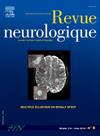Seizure-related cardiovascular symptoms: Comorbidities or SUDEP risk factors?
IF 2.3
4区 医学
Q2 CLINICAL NEUROLOGY
引用次数: 0
Abstract
Sudden unexpected death in epilepsy (SUDEP) is one of the leading drivers of premature mortality in people with epilepsy (PWE), especially in those with difficult-to-treat epilepsy and frequent tonic-clonic seizures (TCS). Cardiovascular symptoms commonly occur in association with seizures, prompting the hypothesis that SUDEP is primarily linked to seizure-related cardiovascular dysfunction. This short narrative review summarizes the spectrum of cardiovascular alterations in the context of seizures and discusses putative links to SUDEP. Focal seizures go frequently along with increased heart rates (HR) that resolve shortly after seizure cessation. HR decrease and ictal asystole (IA) are rarely observed in focal unaware seizures in a small proportion of people with temporal lobe epilepsy. IA is reported to be a self-limiting benign condition without a link to SUDEP. Focal to bilateral or generalized TCS are typically accompanied by excessively released catecholamines, which underlie, in turn, various postictal symptoms. Prominent, sustained sinus tachycardia is a common and benign finding, whereas ventricular fibrillation/tachycardia were only anecdotally reported in a few near-SUDEP or SUDEP patients. Cases of transient, non-fatal atrial fibrillation were also scarcely described in the aftermaths of TCS. Takotsubo cardiomyopathy was rarely reported following TCS, usually with a favorable outcome. In most recorded SUDEP cases, however, a rather stereotypical fatal cascade was consistently documented, characterized by primary central apnea that occurs in the early postictal phase after a TCS, secondarily followed by bradyarrhythmia and terminal asystole. Blood pressure commonly increases in association with focal seizures and TCS, but the pattern may be complex with transient decreases or no significant change during or after seizures. Apart from the immediate effects on cardiovascular function, increasing evidence suggests that recurrent seizures also have a remote impact on cardiac properties, coined by the term `epileptic heart syndrome'. In conclusion, cardiovascular symptoms related to focal seizures are typically transitory and benign. In contrast, TCS can rarely cause postical onset of ventricular tachycardia and acute cardiomyopathy, potentially leading to sudden cardiac death. SUDEP, in turn, was consistently reported to occur in the aftermaths of TCS primarily due to central apnea. To prevent potentially serious cardiovascular complications, full control of TCS whether by antiseizure medication, neuromodulatory devices or epilepsy surgery should be aimed at.
癫痫相关心血管症状:合并症还是SUDEP危险因素?
癫痫猝死(SUDEP)是癫痫患者(PWE)过早死亡的主要驱动因素之一,特别是在那些难以治疗的癫痫和频繁的强直-阵挛发作(TCS)患者中。心血管症状通常与癫痫发作相关,提示SUDEP主要与癫痫发作相关的心血管功能障碍有关。这篇简短的叙述性综述总结了癫痫发作背景下心血管改变的频谱,并讨论了与SUDEP的推定联系。局灶性癫痫发作经常伴随着心率增加(HR),并在癫痫发作停止后不久消退。一小部分颞叶癫痫患者在局灶性无意识癫痫发作中很少观察到HR降低和骤停(IA)。据报道,IA是一种自限性良性疾病,与SUDEP无关。局灶性至双侧或广泛性TCS通常伴有儿茶酚胺过度释放,这反过来又是各种阳性症状的基础。突出的、持续的窦性心动过速是一种常见的良性发现,而心室颤动/心动过速仅在少数近SUDEP或SUDEP患者中报道。短暂性、非致死性心房颤动的病例在TCS术后也鲜有报道。TCS后Takotsubo心肌病很少报道,通常预后良好。然而,在大多数记录的SUDEP病例中,一致记录了相当典型的致命级联反应,其特征是在TCS后早期发生原发性中枢性呼吸暂停,继发缓慢心律失常和终末期无搏停止。血压升高通常与局灶性发作和TCS有关,但其模式可能复杂,发作期间或发作后血压会短暂下降或无显著变化。除了对心血管功能的直接影响外,越来越多的证据表明,反复发作还会对心脏特性产生远程影响,这就是所谓的“癫痫性心脏综合征”。总之,与局灶性癫痫发作相关的心血管症状通常是短暂的和良性的。相反,TCS很少引起室性心动过速和急性心肌病的阳性发作,可能导致心源性猝死。而SUDEP一直被报道发生在TCS后,主要是由于中枢性呼吸暂停。为了预防潜在的严重心血管并发症,应该以完全控制TCS为目标,无论是通过抗癫痫药物、神经调节装置还是癫痫手术。
本文章由计算机程序翻译,如有差异,请以英文原文为准。
求助全文
约1分钟内获得全文
求助全文
来源期刊

Revue neurologique
医学-临床神经学
CiteScore
4.80
自引率
0.00%
发文量
598
审稿时长
55 days
期刊介绍:
The first issue of the Revue Neurologique, featuring an original article by Jean-Martin Charcot, was published on February 28th, 1893. Six years later, the French Society of Neurology (SFN) adopted this journal as its official publication in the year of its foundation, 1899.
The Revue Neurologique was published throughout the 20th century without interruption and is indexed in all international databases (including Current Contents, Pubmed, Scopus). Ten annual issues provide original peer-reviewed clinical and research articles, and review articles giving up-to-date insights in all areas of neurology. The Revue Neurologique also publishes guidelines and recommendations.
The Revue Neurologique publishes original articles, brief reports, general reviews, editorials, and letters to the editor as well as correspondence concerning articles previously published in the journal in the correspondence column.
 求助内容:
求助内容: 应助结果提醒方式:
应助结果提醒方式:


